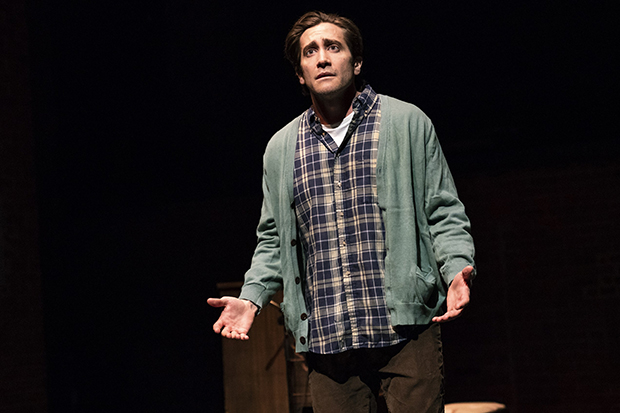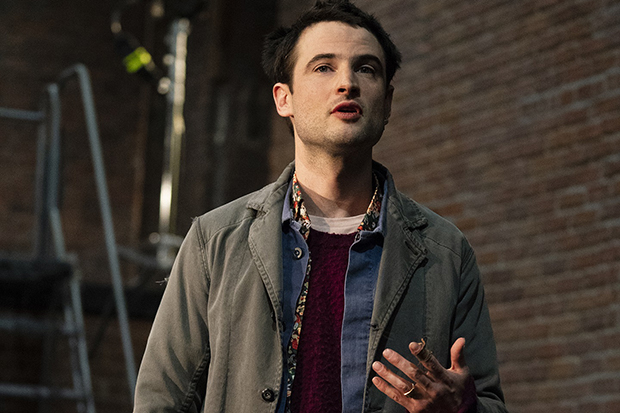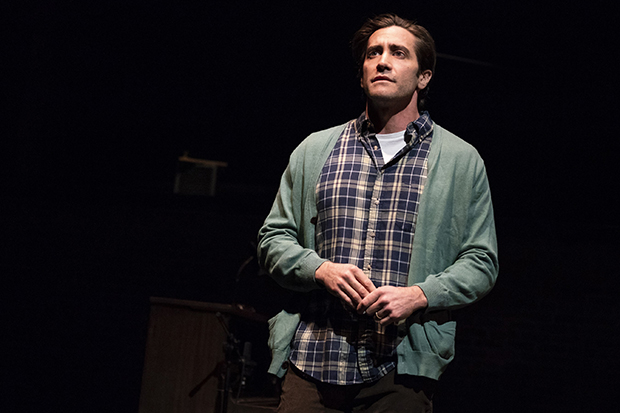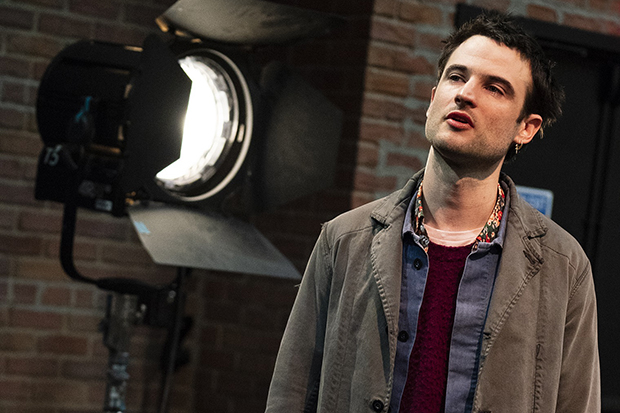Jake Gyllenhaal and Tom Sturridge Play Souls Caught in the Riptide in Sea Wall / A Life
Mortality hangs over two solo one-act plays.

(© Joan Marcus)
A powerful current runs under the barren floorboards of the Public's Newman Theater, where Tom Sturridge and Jake Gyllenhaal are starring in Sea Wall / A Life, a pair of confessional monologues sure to leave you thinking about life and death. No, that's not just the 6 train passing below, but the rumble of a deep kind of sadness that most of us find difficult to fully express.
Sturridge is first up with Sea Wall by Simon Stephens, a playwright best known for his long-running Broadway hit, The Curious Incident of the Dog in the Night-Time. The actor takes his position at the top of a flight of movable stairs while the audience is still filing in. He pours himself a beer and begins to tell us about his worst family vacation ever.

(© Joan Marcus)
We know this story has an unhappy ending from the first few lines, a mixture of pleasant memories and probing observations that wouldn't feel out of place in a eulogy. Sturridge plays Alex, a British photographer. He and his wife liked to take their young daughter, Lucy, to visit her grandfather in the South of France. A gruff old soldier, granddad's armor melted away for his granddaughter. Alex tells us this in past tense, heralding tragedy from his first verb.
Sturridge gives Alex a multitude of tics, not all of which spring naturally from the text. When Hamlet advises the players, "Do not saw the air too much with your hand," he's speaking directly to actors like Sturridge, who manages in 45 minutes to chop down an imaginary forest with his right paw. He revs up to big revelations before abruptly slamming on the brakes, leaving us in poignant silence. Significant moments, like when he "accidentally" kicks over a stack of UNO cards while bounding up the stairs, seem underlined with red pen. It all feels calculated, and we can see the wheels turning in his head through every pregnant pause. "There's a hole running through the center of my stomach," Alex tells us, though it's not clear if he's speaking figuratively or literally. Either way, Sturridge seems determined to fill that hole with lots of business.

(© Joan Marcus)
The second piece is the stronger of the two, thanks to a combination of clearer writing and more restrained acting. The play is called A Life, and it reunites playwright Nick Payne with actor Jake Gyllenhaal, both of whom made their Broadway debuts with Payne's Constellations. Gyllenhaal plays Abe, a man who is about to become a father for the first time. Simultaneously, he is witnessing the slow and painful death of his own father, a victim of heart failure. Payne elegantly weaves the two strands together so that life and death become part of the same thread.
Gyllenhaal brings natural affability to the role, telling this highly relatable story with simple earnestness. Aptly named, A Life brims with vitality: the anxieties, joys, and surprises for which you're never quite prepared as you go about existing. Gyllenhaal manages to convey it all with unexpected intimacy in the largest of the Public's theaters.

(© Joan Marcus)
Some of that can be attributed to Carrie Cracknell's direction, which works better for A Life than it does for Sea Wall. She has staged both on Laura Jellinek's minimalist set, an empty two-tier stage with just a few essential props. Gyllenhaal performs the bulk of his monologue downstage in a tight spotlight that focuses our eyes on him (simple yet uneven lighting by Peter Kaczorowski). By contrast, Sturridge performs his speech with the lights up on all parts of the stage; he seems small and exposed in the vast expanse of the set — the right choice for a character this vulnerable — but it also allows our eyes to wander. It certainly doesn't help when Cracknell inexplicably sends Sturridge upstairs to the second tier, putting even more space between us.
Admittedly, Sturridge has the harder job. Gyllenhaal and Payne humanely unpack a story that will feel instantly familiar to anyone who has lost a parent or gained a child. Sturridge and Stephens force us to contemplate something less common and infinitely more awful. There's sadness in both stories, but only one of them feels like a real tragedy.







